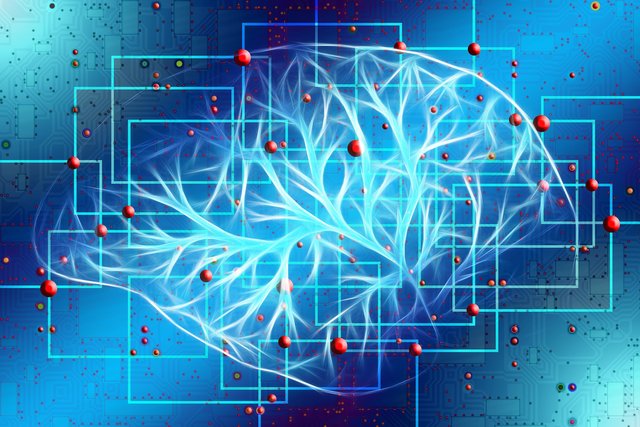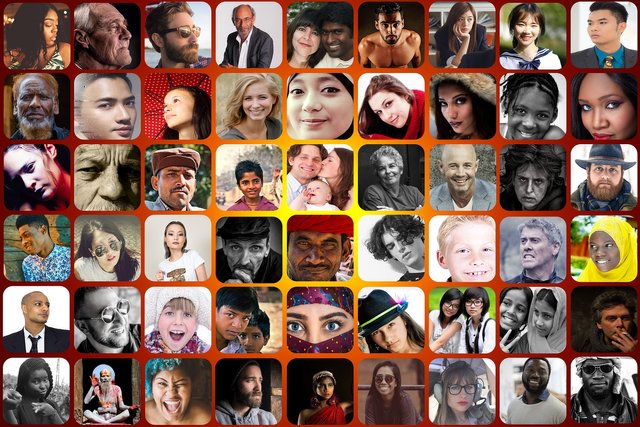Will Artificial Intelligence Unite The Nations? (ENGLISH/TURKISH)

I joined Steemit in January 2018. For about 3 months, I wrote articles for Steemit Turkish community over #tr tag. I was surprised to receive feed-backs about my posts from Steemit members who do not know Turkish. Some of the Steemit members who liked the visuals in my posts requested translation of my writings, and some Steemians red my articles using automatic translation programs. I decided to try my luck in English 10 days ago. I translated a Turkish article into English using translation programs and corrected the errors by passing over the translation. I published my article in Turkish and English. I didn't have a big expectation when I was doing this, and I was surprised when I received 3 times more upvotes than my previous posts. In fact, Turkish citizens constitute one percent of the world's population, and we can estimate that there is a similar ratio in terms of the steemit community. Around 15% of the world's population speaks English. In the Steemit community, this ratio is much higher, and the mass I appeal to has suddenly -at least potentially - increased by more than 10 times. Since then, I have been publishing my articles in two languages and I am happy to be interacting with people from around the world on the occasion of my articles.
After this experience, I wondered if people who don't know any foreign languages can talk to other around the world. What would the world be like when the language barrier was completely eliminated? As I am familiar with the working principles of translation programs, I decided to write this article.
The most popular word of the 1990s was globalization. The two-pole world order, which began after the Second World War, ended after the fall of communism and a wave of globalization began under the leadership of the United States. Thanks to the developments in transport technology, the widespread industry production have already moved to a global dimension. The widespread use of the Internet has paved the way for free circulation of information throughout the world. As the world has now become a global village, it has been suggested that the end of the nation states has come. The trade association, which was developed in Europe from 1945 onwards, was crowned with the free movement of products, services, people and money in 1993. In the following years, the European Union expanded into waves to cover Eastern Europe and the Balkans, and a unified Europe was formed. European nations outside Turkey, which have not yet been accepted are able to live together today.

Globalization remains an effective trend throughout the world, but nationalism continues to preserve its place on the agenda. I consider this situation normal because everyone in the world has no equal benefit from the blessings of globalisation. It was said that the world would become a global village and that the nation states would completely lose the importance, but it was not the case. By time, undeveloped countries have lost power and the peoples of the Middle East and Balkan states who lost their national integrity have suffered great pains due to civil and international wars. Nationalist and protectionist policies continue to find supporters not only in developing countries but also in developed countries as well. Nationalist ideas continue to be effective in Europe and the United States for reasons such as the immigrants, cultural differences and the damage of local businesses from global competition. Britain's decision to leave the European Union and Donald Trump's election as President of the United States may be regarded as the recent gains of nationalist and protectionists.
How can a nation be defined?
- Language Union?
- History and Culture Association?
- The Religious Union?
- State and Legal Order?
- Currency?
- Army?
I think that language is very important in the formation and survival of nations. The world was a global place to some extent before the national states. At various times in history, large imperial structures such as the Roman Empire, the Ottoman Empire and the British Empire were able to establish a global order on the lands they ruled. The nationalism that emerged in France in Modern Times has led to the end of empires. The nation states have created a market economy in themselves. The boundaries of these markets have largely determined by the language union. Of course, there are countries in the world where more than one mother tongue is spoken, but the citizens of those countries should also agree on a common language.
While block-chain technology undermines national currencies, including the US dollar, artificial intelligence seems to be a candidate to lift the language barrier among the people. When will artificial intelligence-assisted translation systems become more useful? It would be appropriate to make a few explanations about these systems to decide.
Although the theoretical basis of translation systems was prolonged until the 1930s, these systems were tried to be produced with manual written program codes until the 1980s. Since the 1980s, machine learning methods have been used for translation. The difference of this method was based on the rules learned from the two-language versions of the texts, which were translated, instead of manually written codes on the recipes of linguists. In 2010, deep learning methods, which became possible to be used with more developed computer capabilities, played an important role in achieving the current level of machine translation. More detailed information about machine learning and deep learning can be found in this article.
Models that are based on language-to-language translation are created today by a deep learning method also called deep neural networks. In the training of deep learning models, a vast set of millions of words are used in two languages that are subject to translation. A special deep learning method called Long Short Term Memory(LSTM) has been developed in 1997 for the free-text processing of the language. The model does not have to re-learn relationships repeatedly when comparing two sets of data on the basis of letters, words and sentences. The method of deep learning which can process the words before and after them, using high quality and very large-scale data efficiently. Improvements such as GPU utilization instead of CPU and distributed data architectures have made it possible for models to learn from a much larger pool of data. As the development in information technology is exponential, it would not be wrong to expect the rapid development of translation software.
Meanwhile, deep learning is used to translate handwriting into computer text, speech to text and text to speech. Therefore, when talking to someone on the phone, it is possible for our voice to go to the other side in another language with today's technology. With the more powerful processors, such systems will become user-friendly over time.
Will computers be able to translate text at human level? I guess the situation will change according to the individual we compare. Will the translators be unemployed? It seems difficult for any software to be able to mimic the translation done by a master translator. Artificial intelligence will probably help improve their productivity rather than replace translators. I think the same applies to other professions that appear under threat. Artificial intelligence algorithms will take place next to people rather than replacing them.

Once artificial intelligence has eliminated the language barrier, one of the major pillars of nation states will be eliminated. It will probably be more difficult for the new generations to adopt nationalist values that use crypto money instead of their own country's currecny, interacting with people all over the world through the internet.
It is difficult to predict what will happen in the future as each effect creates its own reaction. I hope that the development will be towards a colorful, multicultural, cosmopolitan world.
Thanks for reading🤠
YAPAY ZEKA ULUSLARI BİRLEŞTİRECEK Mİ?
Steemit'e 2018 yılının Ocak ayında katıldım. Uzunca bir süre #tr tagı üzerinden Steemit Türkiye topluluğuna yönelik yazılar yazdım. Paylaşımlarım hakkında Türkçe bilmeyen Steemit üyelerinden de tepkiler almak beni çok şaşırttı. Kullandığım görselleri beğenen bazı Steemit üyeleri yazdıklarımın İngilizce karşılıklarını merak edip soruyor ya da otomatik çeviri programlarını kullanarak yazdıklarımı okuyorlardı. 10 gün kadar önce İngilizce bir makale yazıp şansımı denemeye karar verdim. Yazdığım Türkçe bir makaleyi çeviri programlarını kullanarak İngilizce'ye çevirdim ve programın yaptığı çevirinin üzerinden geçerek hatalarını düzelttim. Makalemi Türkçe ve İngilizce olarak yayınladım. Bunu yaparken büyük bir beklentim yoktu, önceki paylaşımlarıma kıyasla 3 kat daha fazla beğeni alınca çok şaşırdım. Aslında ortada şaşılacak bir durum yok, Türk vatandaşları dünya nüfusunun yüzde birini oluşturuyor, Steemit topluluğu açısından da benzer bir oranın söz konusu olduğunu tahmin edebiliriz. Dünyada nüfusunun yaklaşık yüzde %15'i İngilizce biliyor. Steemit topluluğu içinde bu oranın çok daha yüksek olduğu görülüyor, hitap ettiğim kitle bir anda -en azından potansiyel olarak- 10 kattan daha fazla artmış oldu. O günden bu yana yazılarımı iki dilde yayınlıyorum ve dünyanın dört bir yanından insanlarla yazılarım vesilesiyle etkileşim halinde olmak beni mutlu ediyor.
Yaşadığım bu deneyim üzerine acaba bir gün herhangi bir yabancı dil bilmeyen insanlar da dünyadaki diğer insanlarla konuşabilirler mi diye düşündüm. Dil bariyeri tümüyle ortadan kalktığında dünya nasıl bir yer olurdu acaba? İş geçmişim nedeniyle çeviri programlarının çalışma esaslarına aşina olduğumdan bu yazıyı yazmaya karar verdim.
90'lı yılların en popüler sözcüğü küreselleşmeydi. İkinci dünya savaşının hemen sonrasında başlayan iki kutuplu dünya düzeni komünizmin yıkılmasının ardından sona erdi ve ABD'nin önderliğinde yeni bir küreselleşme dalgası başladı. Ulaştırma teknolojisinde yaşanan gelişmeler ve yaygınlaşan serbest ticaret sanayi malları üretimini çoktan küresel bir boyuta taşımıştı. İnternetin yaygınlaşması ise bilginin dünya genelinde serbest dolaşımının önünü açtı. Dünya artık küresel bir köy haline geldiği için ulus devletlerin sonunun geldiği ileri sürülüyordu. Avrupa'da 1945 yılında itibaren gelişerek devam eden ticaret birliği 1993 yılında ürünlerin, servislerin, insanların ve paranın serbest dolaşımı ile taçlandırıldı. İzleyen yıllarda Avrupa Birliği Doğu Avrupa ve Balkanları kapsayacak biçimde dalgalar halinde genişledi ve birleşik bir Avrupa oluştu. Henüz birliğe alınmayan Türkiye dışındaki Avrupalı uluslar bugün bir arada yaşamayı başarıyor.
Küreselleşme dünya genelinde etkili bir trend olarak varlığını sürdürmekle birlikte milliyetçilik de gündemdeki yerini korumaya devam ediyor. Küreşelleşmenin nimetlerinden dünyadaki herkes eşit seviyede fayda sağlamadığı için bu durumu normal karşılıyorum. Dünyanın küresel bir köy haline geleceği ve ulus devletlerin önemini tümüyle yitireceği söylense de pratik öyle olmadı. Bu süreçte gelişmemiş ülkeler iyiden iyiye güç kaybetti ve ulusal bütünlüğünü kaybeden Ortadoğu ve Balkan devletlerin halkları iç ve dış savaşlar nedeniyle büyük acılar çekti. Milliyetçi ve korumacı politikalar gelişmiş ülkelerde de taraftar bulmaya devam ediyor. Göçmenlerin iş piyasasından pay alması, kültürel farklılıklar, yerel işletmelerin küresel rekabetten zarar görmesi gibi nedenlerle Avrupa ve ABD'de de bu ekol politikada etkili olmaya devam ediyor. İngiltere'nin Avrupa Birliği'nden çıkma kararı ve Donald Trump'ın ABD'ye başkan seçilmesi millliyetçilik ve korumacılık yanlılarının yakın dönemde elde ettikleri kazanımlar olarak sayılabilir.
Bir ulus nasıl tanımlayanabilir?
- Dil birliği?
- Tarih ve kültür birliği?
- Din birliği?
- Devlet ve hukuk düzeni?
- Para birimi?
- Ordu?
Ulusların oluşmasında ve varlığını sürdürmesinde dilin çok önemli olduğunu düşünüyorum. Dünya ulusal devletlerin öncesinde bir ölçüde küresel bir yerdi. Tarihin çeşitli zamanlarında Roma İmparatorluğu, Osmanlı İmparatorluğu, İngiltere İmparatorluğu gibi büyük emperyal yapılar hüküm sürdükleri topraklar üzerinde küresel bir düzen kurabilmişlerdi. Modern zamanlarda Fransa'da ortaya çıkan milliyetçilik imparatorlukların sonunu getirdi. Ulus devletler kendi içlerinde birer piyasa ekonomisi oluşturdular. Bu piyasaların sınırlarını büyük ölçüde dil birliği belirledi. Dünyada elbette birden fazla ana dilin konuşulduğu ülkeler de var, ancak o ülkelerin vatandaşları da ortak bir dil üzerinden anlaşıyor olmalılar.
Blok zinciri teknolojisi ABD doları da dahil olmak üzere ulusal para birimlerini zayıflatırken, yapay zeka teknolojileri halklar arasındaki dil bariyerini kaldırmaya aday görünüyor. Yapay zeka destekli çeviri sistemleri ne zaman daha kullanışlı hale gelecek? Buna karar vermek için bu sistemler hakkında birkaç açıklama yapmak uygun olacak.
Çeviri sistemlerinin teorik zemini 1930'lara kadar uzansa da 1980'lere kadar bu sistemler elle yazılan program kodlarıyla üretilmeye çalışıldı. 1980'lerden itibaren çeviri için makine öğrenmesi yöntemleri kullanılmaya başlandı. Bu yöntemin farkı dilbilimcilerin tarifleri üzerine elle yazılan kodlar yerine, algoritmaların metinlerin çeviriye konu olan iki dildeki versiyonlarından öğrendikleri kurallara dayanmasıydı. 2010'larda bilgisayar kapasitelerinin gelişmesi ile kullanılması mümkün hale gelen derin öğrenme yöntemleri dilden dile çevirinin bugünkü seviyesine ulaşmasında önemli bir rol oynadı. Makine öğrenmesi ve derin öğrenme hakkında daha detaylı bilgilere bu yazım üzerinden ulaşabilirsiniz.
Dilden dile çeviriye temel oluşturan modeller bugün derin yapay sinir ağları olarak da isimlendirilen derin öğrenme yöntemiyle oluşturuluyor. Derin öğrenme modellerinin eğitilmesinde çeviriye konu iki dilde milyonlarca kelimeden oluşan devasa veri setleri kullanılıyor. Dilin serbest metin işleme amaçlarına yönelik olarak işlenmesi için Long Short Term Memory(LSTM) adı verilen özel bir derin öğrenme yöntemi geliştirilmiş durumda. Derin öğrenme modelleri LSTM yöntemi sayesinde bir tür kısa süreli hafıza kazanmış oldular. Böylece model harf, sözcük ve cümle bazında iki veri setini karşılaştırırken ilişkileri defalarca kez yeniden öğrenmek zorunda kalmıyor. Kelimeleri kendilerinden önce ve sonra gelen kelimeleri de dikkate alarak işleyebilen derin öğrenme yöntemi kaliteli ve çok büyük ölçekli veride verimli oluyor. CPU yerine GPU kullanımı, dağıtık veri mimarileri gibi gelişmeler gittikçe çok daha büyük bir veri havuzundan öğrenen modelleri mümkün hale getirdi. Bilgi teknolojilerinde gelişim üstel olduğu için çeviri yazılımlarının hızla gelişmesini beklemek yanlış olmayacaktır.
Bu arada, el yazısının bilgisayar yazısına, sesin yazıya ve yazının sese dönüştürülmesinde de derin öğrenme kullanılıyor. Dolayısıyla telefonda biriyle konuşurken sesimizin karşı tarafa diğer dilde gitmesi de bugünün teknolojisiyle mümkün. İşlemcilerin daha da güçlenmesiyle bu tür sistemler zamanla daha kullanıcı dostu hale gelecektir.
Bilgisayarlar insan seviyesinde çeviri yapabilecek mi? Herhalde durum insanına göre değişecektir. Çevirmenler işsiz mi kalacak? Usta bir çevirmenin yaptığı çeviriyi herhangi bir yazılımın yapabilmesi güç görünüyor. Yapay zeka muhtemelen çevirmenlerin yerini almaktan ziyade onların verimlilikleri artıran bir yardımcı olacaktır. Tehdit altında görünen diğer meslekler için de aynı durumun geçerli olduğunu düşünüyorum. Yapay zeka algoritmaları insanın yerini almaktan ziyade onun yanında yer alacaklar.
Yapay zeka dil bariyerini ortadan kaldırdığında ulus devletlerin önemli dayanaklarından biri daha ortadan kalkmış olacak. Kendi ülke parası yerine kripto para kullanan, sanal dünya üzerinden dünyanın dört bir yanındaki insanlarla etkileşim halinde olan yeni neslin milliyetçi değerleri benimsemesi daha güç olacaktır muhtemelen.
Her etki kendi tepkisini yarattığından gelecekte neler olacağını kestirmek güç. Gelişimin çok renkli, çok kültürlü, kozmopolit bir dünyaya doğru olmasını umuyorum.
Okuduğunuz için teşekkür ederim🤠

This is precisely why globalism has failed. You can't have destruction of local economies and businesses and then expect these people to vote for globalist candidates. Populism will only strengthen over the next few years. Just look at what is happening in Italy.
I'm not too sure that globalism is failing at all, take a look at the oil and gas industry around the world, the elites are dominating the price of fuel. Here in Alberta which used to be the rich Texas of Canada now has been broken down by the globalists . Burning down our Tar sands over in Fort McMurray, then shutting down many oil and gas producers. Production hit record lows and the price of fuel went way high. Now the globalists created another fake tax " the carbon tax " which farmers are not very happy about it nor every one who pays taxes. The farmers , ranchers and many other producers are cutting down on their production to reduce costs due to fuel high prices , so the producers are going to short their harvest which in my opinion will make an increase in price for our food and other commodities , this will play right into the globalists hands to control us people.
Interesting .. well done
I think the person must rely on himself now
Thanks for sharing..
Maybe but only until it destroys all nations and humanity
😃😃
Google Translate'e gelen güncelleme ile tarzanca'dan, hatırı sayılır derecede güzel bir duruma geçmişti.
Onun bu jesti karşılığı utopian zamanında on binlerce kelimelik iyileştirme önerilerde bulunmuştum ;) Zaman zaman arkadaki nöral ağı daha doğru bilgilerle beslersek sonuç bizim de işimize yarayacaktır. Mutualizm ;)
Diğer yandan Otostopçunun Galaksi Rehberi kitabında geçen Babil Fish'in öncül örneklerini de görmeye başladık. Çok da uzak olmayan bir gelecekte bunun çoğu kimse için standart bir aksesuar haline geleceğini düşünüyorum.
Her zamanki gibi çok güzel bir katkı 👍👍
Gran post
language away can use the chip one human just like sms emailIt would be appropriate to make a few explanations about these systems to decide
You got a 35.60% upvote from @upmewhale courtesy of @muratkbesiroglu!
Earn 100% earning payout by delegating SP to @upmewhale. Visit http://www.upmewhale.com for details!
Hi, Nice to meet you and Upvoted you :) !
:
凡真心尝试助人者,没有不帮到自己的。
Artificial intelligence is a big boon to the society but there are drawback too like some people will loose jobs but as a whole it is a very good system which will transform the whole generation
👍👍
Ulusların birleşimi daha renkli bir dünyaya açılacağını düşünüyorum. Yine de güç savaşının sonra ermesinin mümkün olmadığını düşünmeden edemiyorum.
Politika ve güç savaşı her zaman olacaktır. Yeter ki içte ve dışta barış olsun.
This post has received a 7.91 % upvote from @booster thanks to: @muratkbesiroglu.